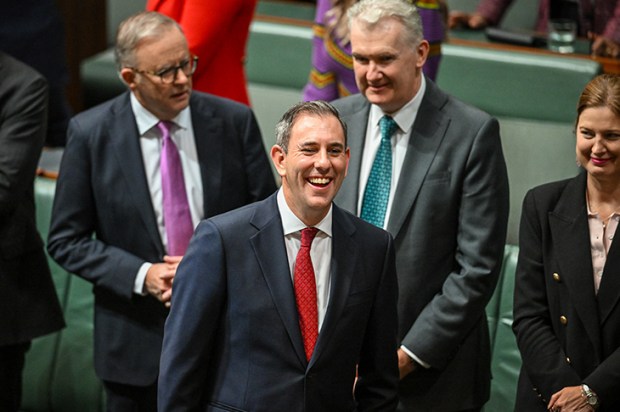If it’s a choice between facts and the vibe, I’ll opt for the facts every time. You wouldn’t expect anything else from a ‘scorched earth’ economist, to use an adjective favoured by Jimbo, who, of course, is not an economist.
But if you are on the losing side of the argument, it must always be tempting to junk logic and empirical evidence and resort to a set of tricks that you hope just might work. This generally involves insulting the opposing side, but what the heck: if you are saving the planet/saving lives/doing God’s work, the end surely justifies the means, to use a hackneyed aphorism of the left.
Before I go through the list of woke-left tricks, it’s worth outlining an important distinction that all economics students learn: the difference between positive and normative statements. (I assume this is also taught in other disciplines.) A positive statement is one that is factual, based on verifiable information. A normative statement is about the ‘ought’: it’s about what should be, in the opinion of the author.
One of the problems with much of the discourse that occurs these days is that this distinction is fudged. The ‘ought’ part is simply assumed and facts, often construed, squeeze in as the preferred backup material.
Take the gender pay gap. The broadly held assumption is that this is wrong and needs to be reduced. The argument then leaps into proposals for various misguided means of reducing the pay gap. Examples include imposed pay hikes for female-intensive occupations or forcing companies to reveal information about their gender pay gaps.
The more legitimate way of thinking about this issue is to ask why the gender pay gap, using the best measurement possible, exists, and why it persists. The next step is to see if the factors that typically influence earnings can explain the gap. These include education, qualifications, occupation, industry, hours of work, job tenure, and the like. Note that we are in the positive realm.
After taking these factors into account, it turns out that the residual gender pay gap can be almost totally explained by the existence of ‘greedy jobs’ that require long and unpredictable hours and often extensive travel.
Women typically shy away from greedy jobs. The pay gap is not about systemic discrimination according to the evidence. Indeed, Claudia Goldin of Harvard was awarded the Nobel Prize last year for this insight and her empirical research.
Now unless we can do away with greedy jobs – and that seems unlikely although a degree of job redesign is possible – the gender pay gap is likely to continue notwithstanding the bleatings of the woke left and many gormless politicians. Costly, ineffective policies are an inevitable consequence of the failure to accept the evidence.
But let me return to the direction of argument used by the woke left when they know they are beaten on facts and logic. One typical accusation is to label the opponent in a debate as ‘alt-right’ or ‘far right’. This conjures up notions of white supremacy, even the KKK. The idea is that if the label can be made to stick, then no one need pay any further attention to the points being made by the dubious contrarian.
But here’s the thing: when this alt-right/far right tagline is ignored, you will often find that what is being proposed is actually sensible stuff, common sense in most instances. Pointing out the dangers of the rapid exit of coal-fired power plants and their replacement with highly subsidised intermittent, land-gobbling energy is hardly alt-right. It’s pointing out the bleeding obvious.
Another tactic of the woke left is to accuse opponents of engaging in conspiracy theories. The idea is that rational people don’t believe in conspiracies and so any line of argument put forward by conspiracists should be immediately rejected.
We saw this in relation to the Covid vaccines that were rapidly developed. It simply makes sense to point out that there was no long-term evaluation of the vaccines and there could always be unforeseen risks, such as serious adverse reactions.
The fact that it became clear very quickly that the vaccines had no measurable impact on population transmission had to be concealed by the advocates of vaccine mandates. Accusing anyone who pointed this out of being a conspiracist was a handy way of achieving this. When dictatorial public health officials, working hand-in-glove with Big Pharma and self-serving politicians, are in charge, this is the puerile level to which debate can quickly descend.
Another more subtle manipulation of debate is to suggest that opponents are mere populists and therefore their arguments should be dismissed. According to elite opinion, anything that smacks of populism must be rejected.
Of course, this rather begs the question of what is populism. It can’t just be something that is popular. After all, politicians can never get elected if they simply propose a suite of policies that are deeply unpopular. The underlying message seems to be that if something appeals to a large number of relatively uneducated people, this is populism and, by definition, is bad.
We saw this argument being used in overdrive during the Trump years in which many of his policies were decried as mere populism. But surely ‘draining the swamp’ was essentially a good idea; standing up to China made geo-strategic and economic sense; and attempting to staunch the flow of illegal immigrants was much needed.
Talking about immigration, many on the left are in favour of completely open borders and essentially disapprove of any initiatives to control the flow of migrants. To counter any alternative points of view, it is common for accusations of xenophobia and racism to be thrown about.
In other words, impugn the character of those making the case for limiting immigration, be it legal or illegal, and hope this is a winning device in the argument. Of course, it’s also necessary to ignore the preferences of the citizens, but the populist point can be made in this context.
The short-hand accusation of labelling something as neo-liberalism or trickle-down economics is often used as a device in debates about economic policy. The idea is that those who disagree with the woke left policy prescriptions of higher government spending and taxes as well as more government regulation and intervention should just be dismissed because they are using discredited theories.
It’s not clear what the proponents mean by these terms – is neo-liberalism just standard economic theory? – but the intent again is to query the standing of those who make alternative arguments. It’s so much easier than debating the main points. There is always the fear that, head-to-head, it is entirely possible that the contest would be lost.
Arguing with the woke left does seem akin to wrestling an eel. But the reality is that when opponents resort to fatuous tactics which are not really any more than name-calling, you know that you are on the winning side. If that’s all they’ve got, sticking to the theory and empirical evidence will always be a winning formula in the long run.
Got something to add? Join the discussion and comment below.
You might disagree with half of it, but you’ll enjoy reading all of it. Try your first month for free, then just $2 a week for the remainder of your first year.













